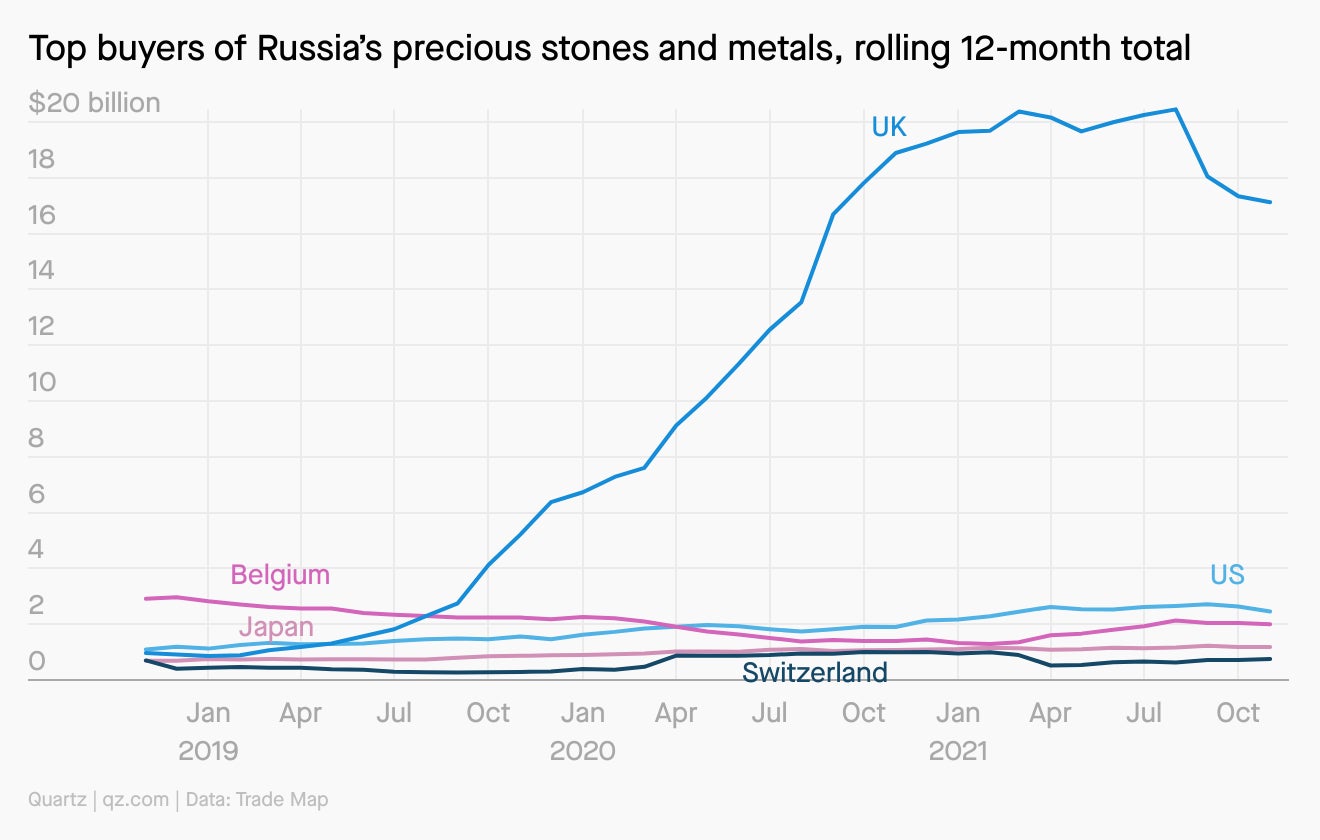🌍 Banning Russian gold
Good morning, Quartz readers!


Good morning, Quartz readers!
Here’s what you need to know
G7 nations will announce an import ban on Russian gold. So far, four of the seven countries have said they’ll join the ban (more below).
Japan warned of an energy shortage. Electric power supplies are expected to be near their capacity in Tokyo and eight nearby prefectures today amid a heat wave.
Russian missiles hit Kyiv. A residential apartment block in Ukraine’s capital was attacked, killing at least one person and wounding six.
Five people were arrested in Hong Kong on sedition charges. The city is preparing to celebrate the 25th anniversary of the British handover and swear in a new government.
Shanghai declared victory against covid as cases in Dandong flared up. Disease control officials said there is no clear origin for most cases in the current wave.
Emergency aid started to arrive in Afghanistan after an earthquake killed at least 1,000 people. Coordinating international help has been a challenge for the Taliban.
Nike will report its earnings today. Shares for the company, which is closing up shop in Russia, are down 36% so far this year.
What to watch for
G7 leaders are meeting in the Bavarian Alps to discuss global inflation and continued pressure on Russia as the invasion of Ukraine continues with strikes in Kyiv. The US, UK, Canada, and Japan will ban Russian gold imports in an attempt to cut funding from the regime of Russian president Vladimir Putin. US president Joe Biden has insisted that G7 nations must stick together in the fight against Putin, while other member countries decide if they want to join the ban. The official announcement is expected Tuesday (June 28).
The UK is by far the biggest importer of Russian gold. UK prime minister Boris Johnson said the ban will “directly hit Russian oligarchs and strike at the heart of Putin’s war machine.” Russia’s gold exports bring in around $19 billion in revenue each year, its largest known export after oil and gas.

Roe v. Wade: What you need to know
Protests broke out over the weekend in the US after the Supreme Court overturned Roe v. Wade, the landmark 1973 decision that legalized abortion in the country. We’ve compiled a reading list about the court’s decision and how it compares with laws around the globe:
See our full Roe v. Wade reading list for the latest articles.
Globalization’s next stop
Globalization held out the shimmering prospect of a zero-friction world. But in global economics, just as in physics, zero friction is near-impossible.
Is globalization really dead, though? In the latest Forecast email, Quartz senior reporter Samanth Subramanian and editor Ana Campoy explain that rather than pronouncing the system dead, we can start planning to alleviate the new frictions created by globalization—as well as the ones that have been there all along.
✦ Get the Forecast in your inbox by signing up for a membership today—you’ll get 40% off when you do!
Quartz’s most popular
😬 Indian startups laid off over 10,000 employees in the first six months of 2022
Surprising discoveries
Microbes in the permafrost could reveal things about life on Mars. The cold and salty environment is one of Earth’s closest analogs to the planet.
A restaurateur sold Jordan’s national dish, mansaf, in a cup. The new way of serving up the dish was met with controversy.
The largest waterfall in the American west has never been open to the public. Industrial structures have blocked access to the natural wonder.
NASA launched its first commercial rocket in Australia. The dry landscape near the equator makes it the ideal site.
The world’s largest bacterium is the size of a human eyelash. Scientists say the size of the thiomargarita magnifica is like if a human were as tall as Mt. Everest.
Our best wishes for a productive day. Send any news, comments, mansaf, and pictures of kangaroos from space to [email protected]. Reader support makes Quartz available to all—become a member. Today’s Daily Brief was brought to you by Clarisa Diaz and Morgan Haefner.